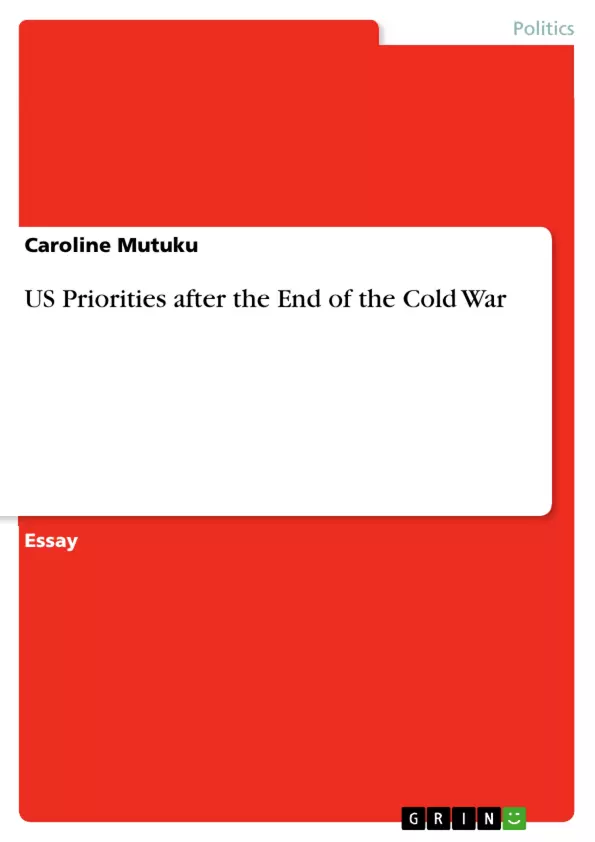After the end of the Cold War, the American policymakers embarked on the creation of a new United States grand strategy, even though they substantially failed in this endeavour. The main reasons behind this failure may be attributed to the challenges posed by domestic as well as international circumstances, coupled with conceptual limitations. Notably, though there remained some basic agreement on US foreign policy between the mainstream forces in the Republican and Democratic parties, it remains evident that the administrations of Clinton and Bush placed varied emphasis at distinct times on varied nations, regions, international issues and organizations, and even on missile defence. Initially, the Republicans extensively criticized Clinton for paying too much attention to China and Russia at the traditional allies’ expense including South Korea and Japan. However, just after a few months in office, especially after the 9/11 incidence, Bush, who had largely neglected China and Russia, came to recognize the significance of good relations of these two nations. Arguably, there was minimal variance in significance that was attached to the G8. As a result, these two Presidents-Clinton and Bush seemed to enjoy this yearly constrained session of the leading industrial nations in the world. Remarkably, this essay will trace the efforts geared at formulating strategies or policy priorities in the administrations of Bill Clinton and those of George H. W. Bush, alongside analysing their shortcomings.
Inhaltsverzeichnis (Table of Contents)
- US Priorities after the End of the Cold War
- Missile Defence System
- US Relations with the United Nations
- Transatlantic Relationship
Zielsetzung und Themenschwerpunkte (Objectives and Key Themes)
This essay examines the development of US foreign policy priorities in the post-Cold War era, specifically focusing on the administrations of Bill Clinton and George W. Bush. It analyzes the challenges and shortcomings encountered in formulating a cohesive grand strategy, particularly in light of domestic and international complexities. The essay delves into the dynamics of US policy towards key issues such as missile defense, relations with the United Nations, and transatlantic relations.
- US Foreign Policy Priorities in the Post-Cold War Era
- Challenges in Formulating a Grand Strategy
- US Policy on Missile Defence
- US-UN Relations
- Transatlantic Relations
Zusammenfassung der Kapitel (Chapter Summaries)
- The essay begins by exploring the US efforts to develop a new grand strategy after the Cold War, highlighting the challenges faced by both the Clinton and Bush administrations. It discusses the varying emphases placed on different countries, regions, and international issues by the two presidents, and examines the role of missile defense in US security policy.
- The second section delves deeper into the contentious issue of missile defense. It traces the history of this policy back to President Reagan's "Star Wars" initiative and discusses the debates surrounding its deployment, particularly the differing perspectives of the Republican and Democratic parties. The essay analyzes the arguments for and against missile defense, highlighting the concerns raised by US allies and the impact of the 9/11 attacks on the debate.
- The essay then shifts its focus to US relations with the United Nations, exploring the historical evolution of this relationship and its complexities in the post-Cold War period. It examines the challenges faced by the UN and the US during this time, including the Somalia tragedy, the Balkans conflicts, and the changing political landscape within the US Congress.
- Finally, the essay explores the relationship between the US and Europe, examining the shared interests and potential for divergence in their perspectives on global issues. The essay analyzes the transatlantic rift in the wake of the Iraq War and explores the historical and contemporary factors shaping the US-Europe relationship.
Schlüsselwörter (Keywords)
The central focus of this essay lies on US foreign policy priorities after the end of the Cold War, with particular emphasis on the Clinton and Bush administrations. Key themes include the challenges in formulating a grand strategy, the debate surrounding missile defense, US-UN relations, and the transatlantic relationship. The essay analyzes the complex interplay between domestic and international factors in shaping US policy, highlighting the historical evolution and contemporary significance of these issues.
What were the US foreign policy priorities after the Cold War?
The priorities shifted between the Clinton and Bush administrations, focusing on integrating Russia and China, managing regional conflicts, and developing a new grand strategy.
How did the 9/11 attacks change George W. Bush's foreign policy?
Initially neglecting Russia and China, Bush recognized the importance of good relations with these nations after 9/11 to build a global coalition against terrorism.
What was the debate surrounding the Missile Defence System?
Republicans pushed for a national missile defense system to counter "rogue states," while Democrats and allies expressed concerns about arms races and the violation of treaties.
How did US-UN relations evolve in the 1990s?
Relations were strained by the tragedy in Somalia and conflicts in the Balkans, leading to a more cautious and sometimes skeptical approach by the US towards UN peacekeeping.
What caused the transatlantic rift during the Bush administration?
The rift was primarily caused by the unilateral approach of the US regarding the Iraq War, which led to significant disagreements with European allies like France and Germany.



